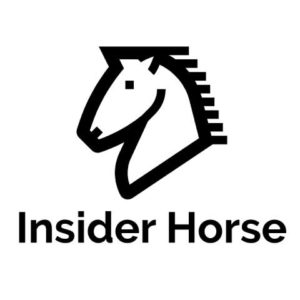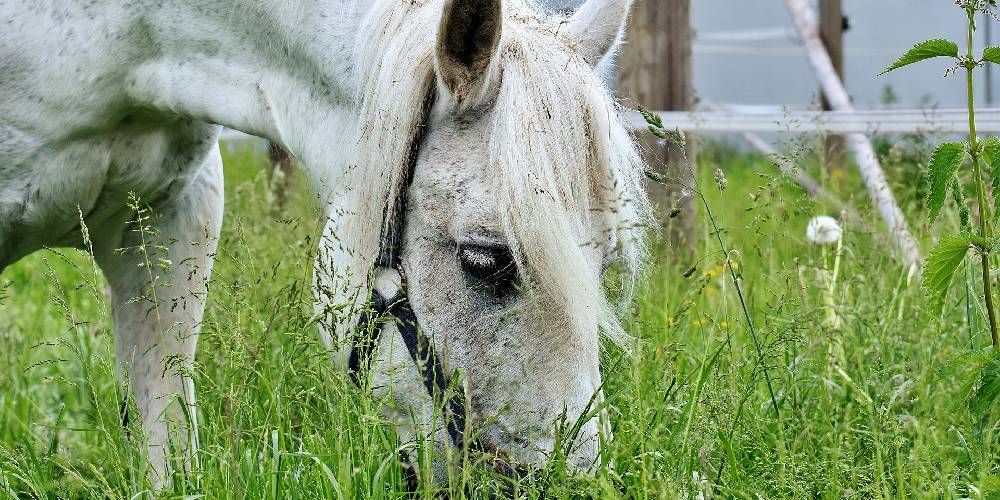Horses are animals who are used to eating all the time. Some horses will even eat over 20 pounds of feed in a day! Because of this fact, it is a really serious issue when your horse stops eating. Your mind might drift to the worst possibilities when you notice your horse not eating. Knowing why your horse isn’t eating and addressing the cause is crucial, sometimes even essential for your horse’s survival.
They Are Suffering From Colic
Colic is one of the most difficult equine issues to deal with. Colic is actually what takes the most lives out of the horse population as compared to any other reason. A horse with colic often stops eating and drinking, shows signs of pain and discomfort, tries to roll and/or lie down, and may paw and kick at their belly.
If your horse is not eating and is showing any of these other symptoms, contacting your veterinarian is the first thing you should do. This is because horses suffering from colic could be suffering from:
- A twisted gut
- A compaction (constipation or compacted mass of fecal matter the horse is struggling to pass)
- Swollen or inflamed intestines
- Sand in the Gastrointestinal tract
- Parasite infestation
- A blockage
- Severe bloat
They Are Choking
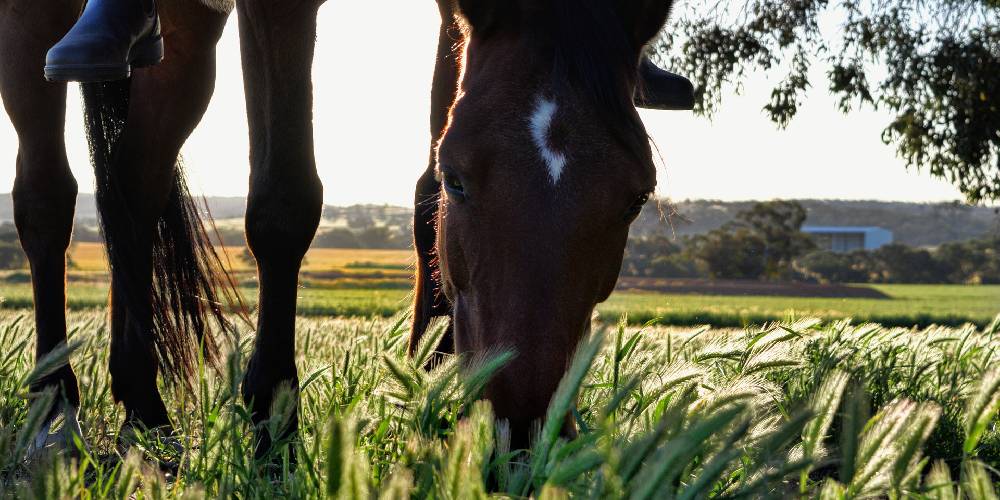
Because horses don’t breathe through their mouths, they don’t choke as humans choke. Humans, when choking, are unable to breathe and will soon die if the piece of food or other object blocking their airway is not removed. Horses, on the other hand, can choke for days upon days because just their esophagus or food pipe is blocked rather than their trachea or windpipe.
When horses choke, a large piece of food or other material is filling the esophagus preventing any food or water from getting down the horse’s throat. Horses in this situation show signs of distress and will stop eating and drinking. These horses will try to cough up what they are choking on and may drip pieces of food, mucus, and saliva from their nose and mouth.
In many situations, the horse can eventually swallow and free the blockage themselves, but if the choke persists over the span of a day or two, giving a call to your veterinarian may be necessary. The veterinarian would need to clear the blockage and allow your horse to drink and eat.
They Have Ulcers
Horses, especially those who are in stressful situations or have high levels of anxiety, can suffer from gastric ulcers. Other causes for gastric ulcers can include:
- Stress
- Anxiety
- Excessive use of medication (especially NSAIDs)
- Excessive exercies in an empty stomache over a period of time
- High consentrates in the diet
An ulcer is caused when the stomach acid eats away and irritates the stomach lining. They can be very uncomfortable, irritating, and painful for the horses to put up with.
Horses suffering from ulcers may find it uncomfortable to eat so even if they eat some of their food, they may not finish it all due to the pain.
Feeding your horse food that lowers the strength of the acid can help. I recommend feeding your horse some alfalfa for hay and beet pulp or beet pulp-based feed for grain. This can make your horse more comfortable with eating and can even possibly reduce the effects of the acid to let the ulcer(s) heal.
Dental Pain Or Issue
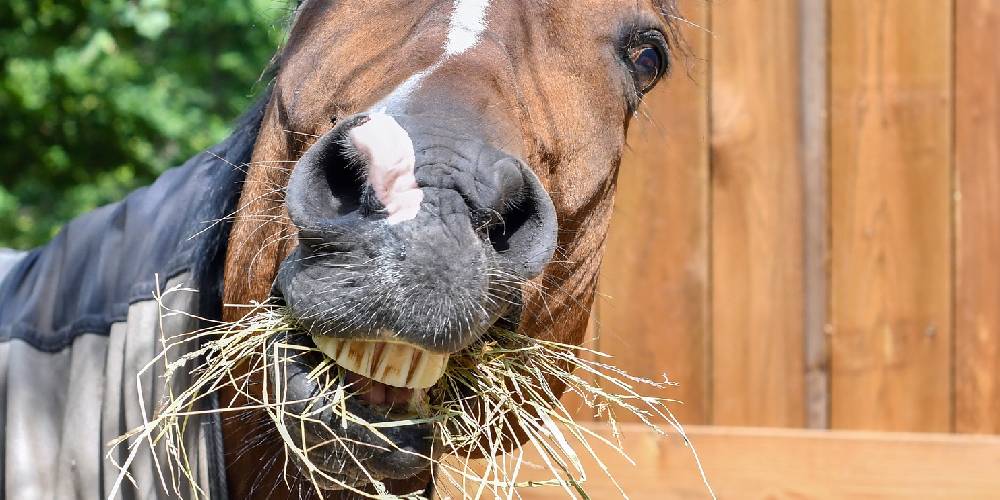
You know how when you have a toothache or a sore in your mouth sometimes you don’t want to eat because it hurts too bad? this goes for horses as well! Horses who are behind on dental work and have sharp edges and hooks on their teeth may stop eating or have trouble eating because of the discomfort this causes them.
Some horses may even get abscesses in their mouth that make it painful or hard to eat.
Having a veterinarian or equine dentist come look at your horse’s teeth could be really beneficial to take care of whatever dental or oral issue is affecting your horse and preventing them from enjoying their food.
Your Horse Has Been Injured
Most of the time, injuries don’t affect the horse’s appetite in the slightest and the horse will still willingly eat their food even if their injury is serious. If a horse is injured and is not eating, however, its lack of appetite can be tied back to its injury.
In some rare cases, horses can stop eating because of an infection or illness that they got from a certain injury. If your injured horse does not have an illness or infection and is still not eating, it is likely that they aren’t eating due to the pain of the injury. Giving them a safe over the counter pain medication in safe doses can help the issue.
The Horse Has Diarrhea
A horse who is suffering from diarrhea may stop eating and drinking because of the severe discomfort this can bring them. Diarrhea in horses is caused by poor medication use, illness, bacterial infection, parasites, viruses, or even diet changes.
Horses will usually get past this miserable condition within a couple of days their diet isn’t usually affected. However, if your horse stops eating or drinking, calling a vet may be the best thing to do so the horse doesn’t become dehydrated and the horse’s bowel functions return to normal.
Separation & Anxiety
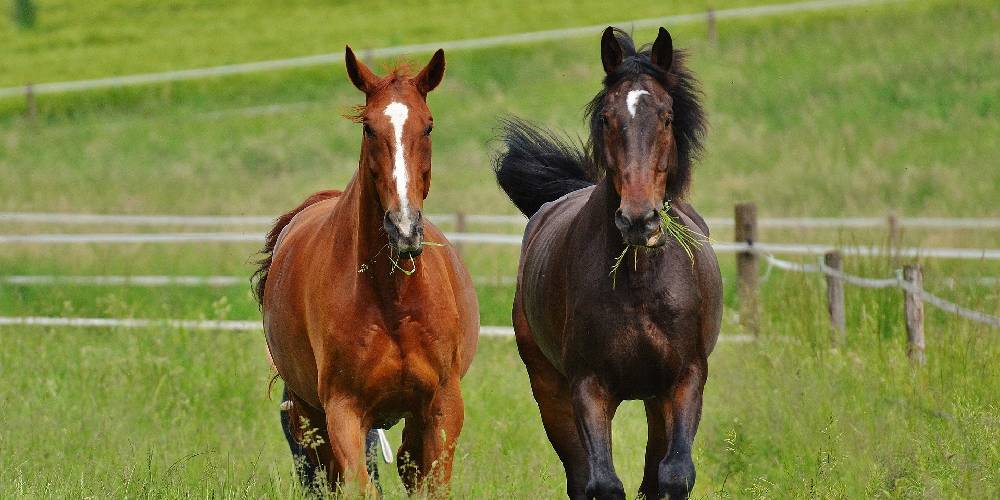
Sometimes horses who have been separated from a close herd member or are put in a stressful situation will refuse to eat because of the amount of stress that they are under.
I have seen this in my horses. When one of my horse’s close barn friends left for a new home, my horse refused to eat his food for several days and showed great agitation at the loss of his old friend.
This is also seen with show horses. some horses get stressed and anxious when they leave their homes so refusing to eat is not an uncommon thing for horses to do in this situation.
If your horse is not eating because of one of these reasons, putting them close to a calmer horse can help to reduce their stress, or even giving them a calming sedative or paste can help to bring down their nerves.
Abrupt Change In Diet
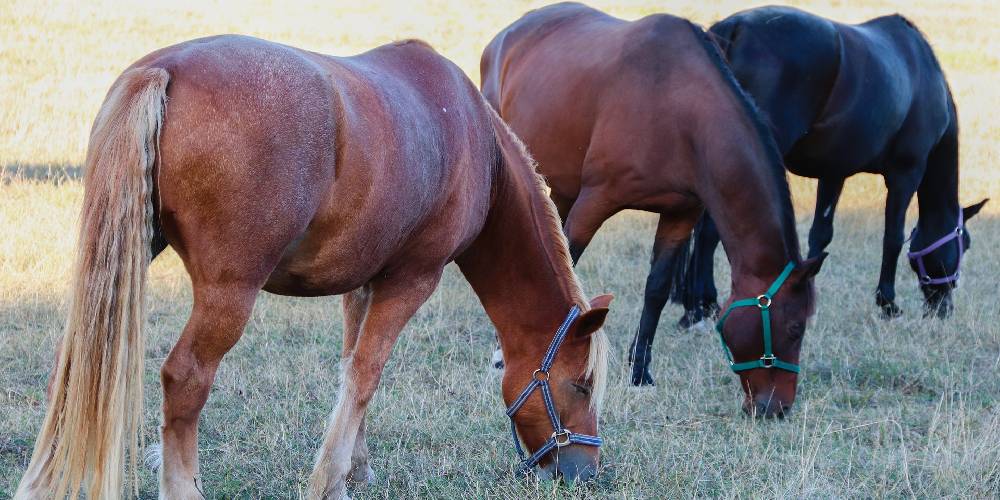
Sometimes, horses don’t like to try to eat new things. If you just got a new horse and are trying to feed them new hay or grain different than what they are used to, they may not eat it at first. This is because horses are animals who like consistency. A consistent diet helps with their bodily functions as well as their mental recognition of food.
If there is an abrupt change in the horse’s diet, they may not eat it because they aren’t used to it yet. Give the horse a few days to adjust or try to gradually introduce a new food or grain into the horse’s diet rather than making a drastic change all at once.
Dehydration & Excessive Heat
I don’t know about you, but I really don’t like to eat too much when it is really hot out. I can start to feel sick or just unsettled if I eat too much in the heat and it turns out horses are like this too. Because of this, if a horse is really dehydrated, they may not want to eat their dry hay because they are so hot and deprived of water.
To fix this issue, I recommend giving your horse electrolytes to help get the horse more hydrated and wanting to drink water and even mixing some water in with their grain so they get some water intake with their food.
Making sure your horse is hydrated will help to keep your horse eating.
Bullying
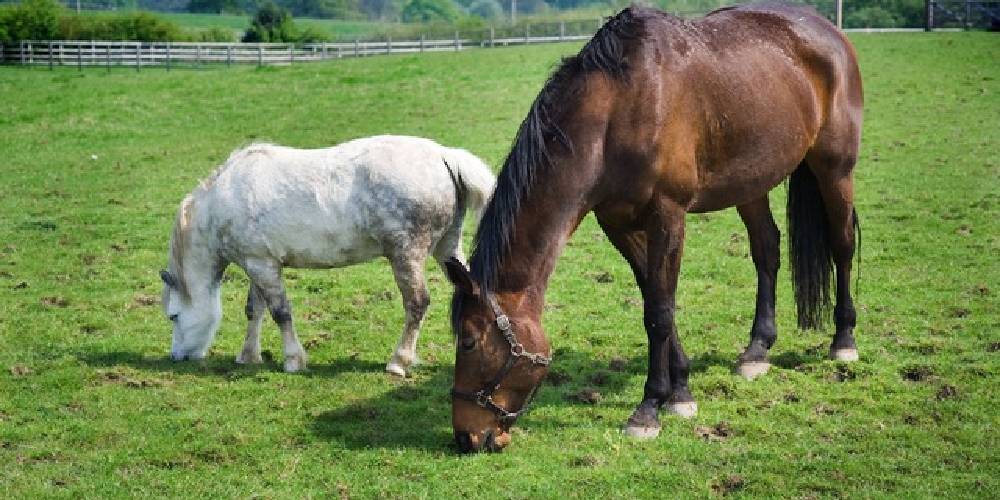
Horses are bullies and will pick on each other all the time. Lead horses and stallions will especially pick on younger, smaller, or more timid individuals of the herd. Because of this, some horses just can’t eat or else they will be driven away from the food by a lead mare or stallion.
If you have a lot of horses turned out together and you notice one is losing weight or is being kicked off of their food consistently;y, I would recommend separating these horses, especially for feeding time to make sure that everyone is getting their fair share of food.
